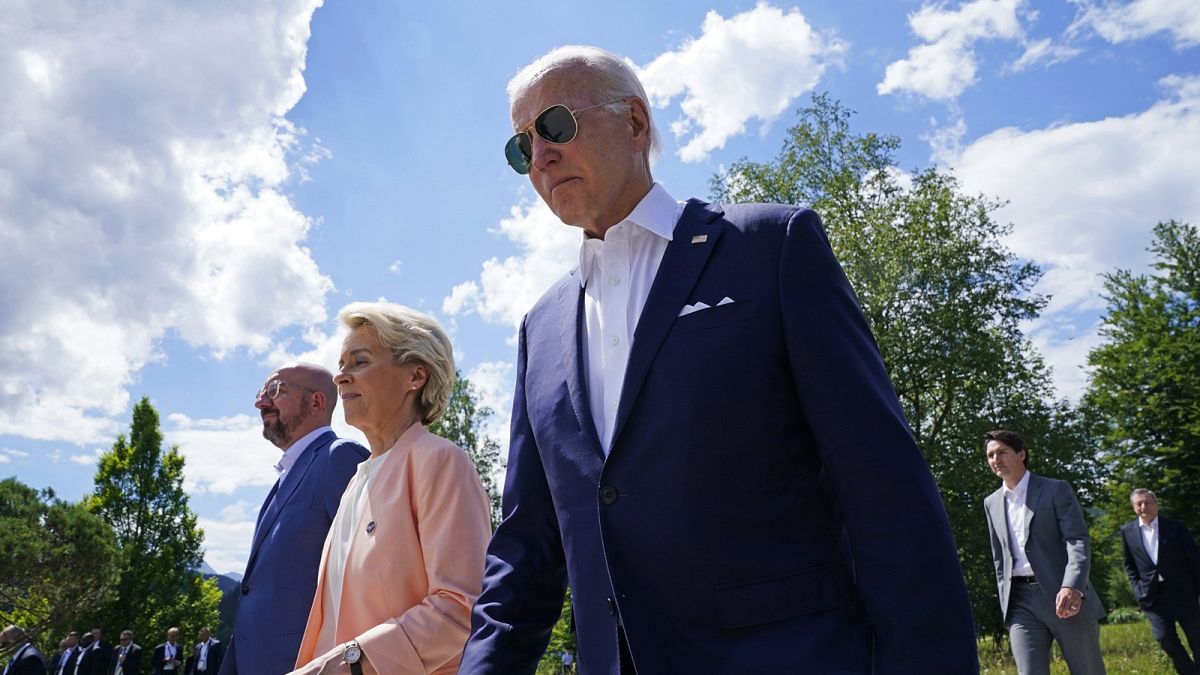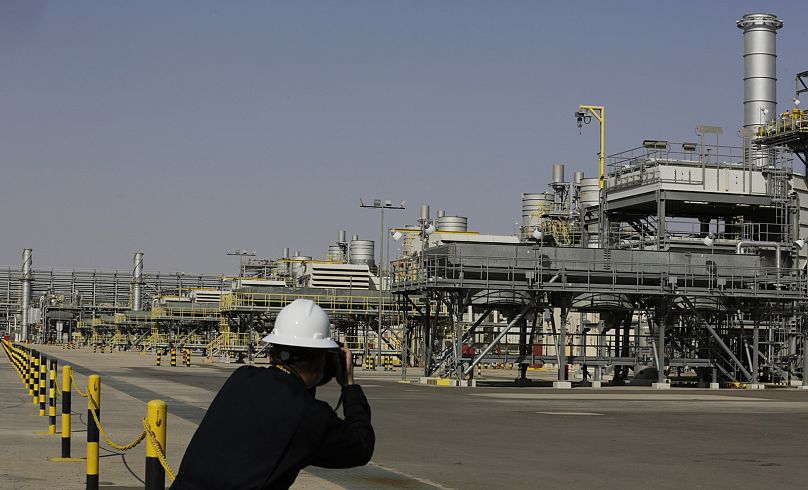Western countries want to use their leading insurance and shipping companies to slash the Kremlin's oil revenues.
As the war in Ukraine nears its eighth month with no resolution in sight, Western countries are stepping up efforts to strip Russia of its largest source of income: oil.
The West suspects the Kremlin is bankrolling the invasion with its profits from the continued sale of fossil fuels, which make up over 40% of its budget.
This is why the world's largest economies making up the Group of Seven (G7) have pledged to put a cap on the price of Russian oil sold around the world.
This cap would prevent Russian cargoes from selling oil that exceeds the still-undefined G7 limit. As a result, Russia would be deprived of a significant portion of the oil revenues that it would otherwise earn without the cap.
According to Russia's central bank, exports of crude oil accounted for €113 billion in 2021, on top of the €70 billion earned from refined products, such as gasoline and diesel.
This year's numbers are on a similar trajectory: in the first six months of the war, Russia made €158 billion from fossil fuel commerce, two-thirds of which (€102 billion) came from the oil industry, according to CREA, a research centre that tracks Russia's exports. The European Union was the largest buyer.
But the situation will soon change as 5 December marks the final deadline for EU countries to ban all imports of Russian seaborne crude. Two months later, on 5 February, they will be compelled to do away with all refined petroleum products.
Out of all sanctions imposed by the bloc, this gradual ban on Russian oil is arguably the most radical decision owing to its potentially disruptive impact on the economies of both Russia and Europe. It was also subject to fraught negotiations between EU countries.
The West now plans to go beyond national embargoes.
An international price cap “will help deliver a major blow for Russian finances and will both hinder Russia’s ability to fight its unprovoked war in Ukraine and hasten the deterioration of the Russian economy,” said US Treasury Secretary Janet Yellen.
But analysts warn the G7 initiative is untested and ridden with risks and unknowns, many of which escape Western control. A botched implementation, they say, could reverberate on a global scale.
A looming clash of cartels
Although interlinked, the EU embargo and the G7 cap are very different.
For the EU, the decision was relatively straightforward, even if controversial: the 27 countries, acting as a single market, resolved to stop buying supplies of Russia's seaborne oil. (Pipeline flows were exempted at the request of landlocked countries.)
The EU ban was a consumer choice for a domestic market while the G7 price cap is something else entirely.
Countries intend to prohibit their banking, insurance and shipping firms from providing services to Russian companies that sell oil at a price that exceeds the limit set by the G7.
For example: if Russia is selling its Urals crude oil at $75 a barrel and the G7 cap is set at $50 a barrel, Western companies will only be allowed to service Russian tankers that carry oil with a price tag of $50 or below. Anything above that level would activate the prohibition.
In this example, Russia would lose $25 per barrel sold.
But here's the first catch: Moscow is already selling its Urals crude at a discounted price compared to the Brent benchmark. The Urals-Brent difference, which was less than $2 in January, now hovers around $23 per barrel.
China and India have taken advantage of the discount, ramping up purchases of Russian crude and undermining the West's united front.
A modest G7 price cap would therefore leave the status quo mostly intact.
If the G7 chooses instead to apply a more stringent and stifling cap, Russia could stop selling barrels altogether, a market disruption that would directly hit developing countries.
"There's a way to adapt the price cap depending on market trends," said a senior EU official, who was not allowed to speak on the record. "The G7 cap has to be set at a level in which Russia is still willing to sell."
Oil prices change every day and are subject to supply-demand variations in the market, which remain essentially at the mercy of OPEC Plus, the powerful organisation of oil-exporting nations that includes the likes of Saudi Arabia, Venezuela and Russia.
On the very same day the EU approved the legal basis to underpin the G7 cap, OPEC Plus agreed to cut its production by a larger-than-expected two million barrels a day in a bid to boost prices. The group cited the uncertain global outlook as a reason for the reduction.
"We would rather be pre-emptive than be sorry," said Abdulaziz bin Salman, Saudi Arabia's energy minister.
The move resulted in the prices of Brent and Urals crude immediately going up.
The timing of OPEC's announcement did not go unnoticed in Brussels and in Washington.
"The president [Joe Biden] is disappointed by the short-sighted decision by OPEC Plus," US officials said in a statement. "This decision will have the most negative impact on lower- and middle-income countries that are already reeling from elevated energy prices."
The coincidence of events exposed the inherent vulnerabilities of the G7 price cap and set the stage for a potential clash of cartels.
"Russia is a huge oil geopolitical player and now sits with many allies in OPEC Plus. So the G7 move is one to bring a cartel in opposition to OPEC, who will be scared this will set a precedent," said Ben McWilliams, an energy analyst at the Bruegel think tank.
"OPEC will not like the concept of oil price caps. It's a push towards 'buyers control' in the market." McWilliams told Euronews. "They might react badly and be pushed towards Russia."
Alternatives to Western dominance
Besides the inevitable pricing variations and OPEC's mighty sway, the G7 faces another yet-unanswered question: can Russia's oil trade survive without Western companies?
Commercial oil tankers need insurance to cover the costs of incidents beyond their control, such as delays, damage to supplies, leakage, theft or even war.
The G7 believes the dominant position enjoyed by EU and UK-based insurance firms will make it nearly impossible for Russian cargoes to find coverage somewhere else.
As part of its gradual embargo, the EU imposed a total ban on providing this kind of service but this will be eased if the G7 manages to introduce the price cap. European insurers will then be allowed to service Russian tankers only if their crude barrels do not exceed the limit.
A similar prohibition will apply to the provision of shipping services. Greece has the world's largest fleet of oil tankers, many of which help Russia sell oil around the world.
Here, a new obstacle emerges: under maritime law, ships are allowed to sail under the flag of any country, regardless of who owns the ships.
The practice, known as the "flag of convenience," enables owners to avoid high taxes and stiff regulations. Re-flagging is widespread: about 40% of the global fleet is registered in Panama, Liberia and the Marshall Islands, despite these countries barely owning any vessels themselves.
In its latest raft of sanctions, the EU attempted to close this loophole by expanding its services ban to any vessel that sails under a non-EU flag and carries Russian oil above the G7 price cap. But neither Panama, Libera nor the Marshall Islands are part of the G7 and are therefore not obliged to toe the line.
While Western countries try to use their insurance firms and vast maritime fleets as leverage to force the Kremlin's hand, Russian cargoes could find alternative suppliers to replace the banned services.
This makes the G7's success contingent upon the participation of non-Western countries, including Russia's top clients: India and China. The EU is still awaiting the cap's precise details before giving its final green light.
"Washington's ability to cobble a broad coalition in implementing the price cap, particularly to include countries with major shipping industries such as Panama and Liberia, and secure explicit or tacit participation from some big Russian oil buyers led by India will be key signposts for the EU's willingness to fully back the plan," said a group of analysts at the Eurasia Group, a risk consultancy.
The US Treasury has estimated that capping the price of Russian oil at the international level would result in $160 billion (€165 billion) in annual savings for the 50 largest emerging economies, something that might entice other countries to throw their support behind the G7 initiative.
But if the cap triggers unintended consequences, such as onerous obstacles for maritime transport, sudden price shocks or a widespread shortage of supplies, the G7 could make more enemies than allies. Beijing has said oil is a "vitally important" global commodity that should not be put at risk.
"It is very optimistic to believe this [price cap] can work," Ben McWilliams said.
"In fact, I don't believe even the architects think it will work perfectly. They just prefer a 'leaky system' in which Russia can still make some profit above the cap rather than a scenario in which Russia is completely forced off market."

